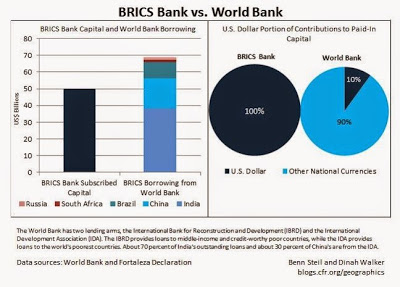It seems that in every generation there are declinists -- those who believe that the US is in decline. The current wave tends to focus on two concepts.
The first is secular stagnation, resurrected by Lawrence Summers earlier this year. The concept was forged during the Great Depression and was subsequently refuted by experience as the US entered a long expansion wave. Summers argues that in recent decades the only way that stagnation was avoided was by the creation of bubbles.
At the risk of over-simplifying, our take was two-fold. First, like Paul Kennedy's Rise and Fall of Great Powers, what was ostensibly applicable to the US, proves more relevant of others. In Kennedy's case, it was the collapse of the Soviet Union that was most telling. The secular stagnation hypothesis seems more applicable to the euro area than to the US. Second, to the extent that it is relevant for the US, it seems like a more global phenomenon, especially among the high income economies and many emerging market economies.
The second main argument of the declinists has two expressions: The weak form says that the rise of the rest of the world has closed the gap between the US and others. The US is no longer the hegemonic power. We live in world that political scientists Ian Bremmer and David Gordon characterized as "G-Zero". The strong form of the argument is the China is moving to supplant the dollar and the US as the world's most important economy.
When it comes to the role of the dollar, the declinists have the argument already constructed, they simply lack the evidence. In the late-1990s through the early noughts, there was much hope among many declinists that the euro would replace the dollar as the numeraire. Many observers thought the Great Financial Crisis, with the epicenter in the sub-prime US real estate market, signaled the death knell of the dollar.
The declinists jumped all over the Governor the People's Bank of China call for SDRs to supplant the dollar. More recently, some observers thought digital money, like , challenged the role of the . One economist at a major US bank went so far as to advocate central banks consider Bitcoins as an alternative reserve asset to diversify away from the dollar. The declinists have bounced around from one thing to another while the dollar's role in the world economy has barely changed since the mid-1990s, after the distortions caused by the preparations for European Economic and Monetary Union.
The launch of a BRICS development bank recently was embraced by the declinists as the latest evidence of the demise of America. Yet, it is predicated on the dollar more than most could imagine. Consider this Great Graphic from Ben Steill and Dinah Walker at the Council on Foreign Relations.

India and China are the two biggest borrowers from the World Bank. Brazil is the 9th largest borrower. Together they have borrowed $66 bln from the World Bank. As Steill and Walker point out this is about a third larger than the initial capitalization of the BRICS new development bank ($50 bln). It can supplement on the margins, but it cannot supplant the World Bank.
In addition, as we have seen with China's bilateral swap lines, announcing a new facility is one thing, which is difficult enough; making it operational is a different story. Finding appropriate development projects and creating proper incentive structures have often eluded the World Bank. What do the managers of this development bank know that the best and brightest at the World Bank don't?
Just as revealing, look a the right-hand side of the chart. The entire paid-in stock of $50 bln is solely in US Dollars. In contrast, only 10% of the paid-capital of the World Bank is in dollars. Ironically, this means that the BRICS development bank does not really challenge the role of the dollar or the World Bank. It is mostly bluster and PR, which the declinists are predisposed to run with yet again.
3rd party Ad. Not an offer or recommendation by Investing.com. See disclosure
here or
remove ads
.

